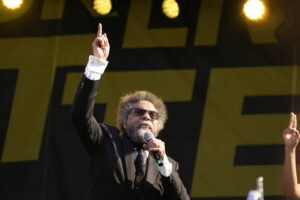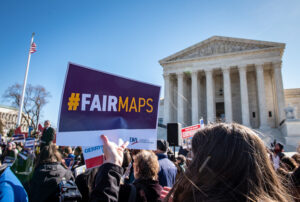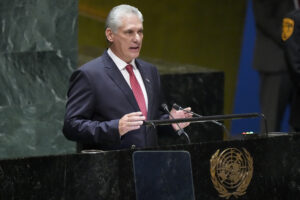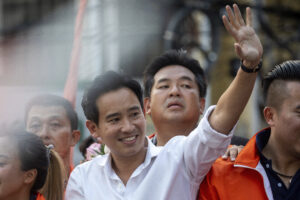Fighting a Mockery of Democracy
With the 2008 presidential election on the horizon, a novel plan to circumvent a constitutional amendment and eliminate the anti-democratic Electoral College is gaining momentum in Maryland and other states.WASHINGTON — “The individual citizen has no federal constitutional right to vote for electors for the President of the United States.”
That is not some reactionary piece of propaganda denying your right to choose the next president. It is one of the more memorable sentences from the Supreme Court’s decision in Bush v. Gore, the hard-to-forget 2000 case that put the current occupant in the White House for his first term.
And strictly speaking, the court was right. As the majority opinion went on to note, we have the right to use our ballots to pick members of the Electoral College — which in turn chooses the president — because every state legislature has decided on “statewide election” as the way to get the job done. In theory, legislatures have the power to pick electors without even consulting the voters.
The American way of electing the president is antiquated, impractical and dangerous. It is odd indeed that in 2000, a nation devoted to bringing democracy to the world gave power to the man who actually received 543,895 fewer votes than his opponent.
George W. Bush, not Al Gore, became president because our system deemed Bush’s disputed 537-vote margin in Florida more important than Gore’s half a million ballot advantage nationwide.
And please, dear Republican friends, don’t shout “Get over it!” Think back to 2004, when Bush defeated John Kerry by 3 million popular votes nationwide. If just 59,300 voters in Ohio had voted for Kerry instead of Bush, Kerry would have won the Electoral College and become president. You can write the script for the Fox News commentaries about Kerry stealing the White House and the terrible anti-democratic example the United States was setting.
It does not have to be this way, and as a citizen of Maryland, I am proud that my state has started a process that could lead to popular election of the president. Gov. Martin O’Malley has said that he would sign a bill moving through the Legislature that would commit the state’s 10 electors to voting for the winner of the nationwide popular vote.
The law would not take effect unless states representing a 270-vote Electoral College majority passed similar laws. The idea is to create a compact among states genuinely committed to popular rule.
Isn’t this an effort to circumvent the cumbersome process of amending the Constitution? Absolutely, and that’s the only practical way to move toward a more democratic system. Because three-quarters of the states have to approve an amendment to the Constitution, only 13 sparsely populated states overrepresented in the Electoral College could block popular election.
Remember, states get electoral votes for each member of Congress and both senators. No matter how small, every state gets at least three electoral votes. The three electors from Wyoming, with a 2006 population estimated at 515,004, represent 171,668 people each. California, with a population of 36,457,549, gets 55 electors, each representing 662,865 people. Every vote cast in Wyoming thus has nearly four times the value of every vote in California.
Not very democratic, is it?
What is democratic is for elected legislatures to take the problem into their own hands by using their electoral votes to support the popular national winner. The idea was pioneered by John R. Koza, a consulting professor at Stanford (he also invented the scratch-off lottery ticket), and advanced by the National Popular Vote campaign.
The effort in Maryland was spearheaded by newly elected state Sen. Jamie Raskin, who has devoted a good part of his legal career to advancing more democratic election and campaign finance laws. In Arkansas, Hawaii and Colorado, one legislative chamber has already approved the idea.
Opponents of popular election invent scary scenarios to continue subjecting our 21st-century nation to a system invented in the far less democratic 18th century. Most frequently, they warn about having to recount the entire country in a close election.
But popular election of presidents works just fine in other countries, notably in France, which votes later this month, and in Mexico, which managed to get through a divisive, terribly narrow presidential election last year. Are opponents of the popular vote saying our country is less competent at running elections than France or Mexico? And does anyone really want to risk repeating our experience from 2000?
Here’s hoping that Maryland sets off a new American Revolution aimed at bringing our electoral practice into line with our democratic rhetoric. Our states have the power to give individual citizens the right to elect their president — directly.
E.J. Dionne’s e-mail address is postchat(at symbol)aol.com.
© 2007, Washington Post Writers Group
Your support matters…Independent journalism is under threat and overshadowed by heavily funded mainstream media.
You can help level the playing field. Become a member.
Your tax-deductible contribution keeps us digging beneath the headlines to give you thought-provoking, investigative reporting and analysis that unearths what's really happening- without compromise.
Give today to support our courageous, independent journalists.






You need to be a supporter to comment.
There are currently no responses to this article.
Be the first to respond.